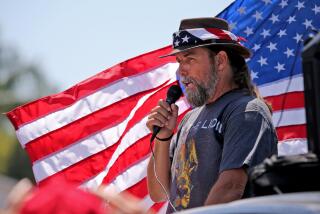Karl Hettinger; Survived 1963 ‘Onion Field’ Attack
- Share via
Karl Hettinger, the troubled survivor of the “Onion Field” attack that claimed the life of his police partner 31 years ago, died Wednesday at a hospital in Bakersfield after an illness of several months.
Hettinger, 59, who suffered crushing bouts of depression and left the Los Angeles Police Department after the brutal ordeal, made a comeback as a politician in recent years, serving as a Kern County supervisor from 1987 until his defeat in a bid for reelection in 1992.
“He was a great police officer and a great man who pulled himself up out of having been involved in a great tragedy,” former Los Angeles Police Chief Daryl F. Gates told the Associated Press on Wednesday night.
“I think he always felt guilty because he ran,” Gates said. “I could never understand it. If he had stayed, he’d have been dead.”
The story of Hettinger, his partner, Ian Campbell, and ex-convicts Gregory Ulas Powell and Jimmy Lee Smith was chronicled by Joseph Wambaugh in his best-selling book and movie, “The Onion Field.”
On the night of March 9, 1963, Hettinger, then 28, and Campbell, 30, stopped Powell, 32, and Smith, 29, for making an illegal U-turn in Hollywood. Before the officers could react, Powell pulled a gun, pointed it at Campbell and ordered Hettinger to surrender his pistol.
“I didn’t want to give up my weapon, but my partner had a gun in his back,” Hettinger told an interviewer in 1985. Campbell “asked me to give it up several times. I did it reluctantly.”
Forcing the disarmed officers into a stolen car, Powell and Smith drove north to a deserted dirt road in rural Kern County south of Bakersfield, where the gunmen marched their hostages into an onion field.
“Powell then executed Campbell with a pistol shot to the face,” Hettinger said. “I knew I was next. I turned away and ran down the road. When I looked back, they fired at me. . . .”
Hettinger said a cloud passing in front of the moon probably saved his life, giving him a moment of darkness to hide among tumbleweeds piled against a fence. He said that when the killers drove off, he set off again, running four miles across irrigated fields to a farmhouse, where he phoned for help.
Powell was captured about two hours later while driving back to Los Angeles. Smith was arrested the next day at a rooming house in Bakersfield. During subsequent trials, both men were convicted of murder and sent to prison.
Powell remains in prison; Smith, paroled several times, has had several subsequent brushes with the law.
In 1985, during one of Powell’s unsuccessful bids for parole, Hettinger argued passionately against his release.
“I still get uneasy . . . I still can’t sleep very well,” Hettinger said at the time, his voice breaking and his fists clenched. “I can still see their faces. . . .”
But the crime and the punishment are only part of the story.
Hettinger’s decision to surrender his pistol led to an LAPD directive admonishing officers never to surrender their weapons under any circumstances. Hettinger began to suffer intense feelings of guilt about his partner’s death, and eventually was forced from the Police Department after he was caught in a series of shopliftings.
Hettinger worked as a gardener in Los Angeles for a while, then moved to Bakersfield in 1972. Five years later, he got a job as an assistant to Kern County Supervisor Trice Harvey. When Harvey won election to the Assembly in 1987, then-Gov. George Deukmejian appointed Hettinger to finish Harvey’s supervisorial term. Hettinger won election to the post in 1988.
Times staff writer Nieson Himmel contributed to this story.
More to Read
Sign up for Essential California
The most important California stories and recommendations in your inbox every morning.
You may occasionally receive promotional content from the Los Angeles Times.












